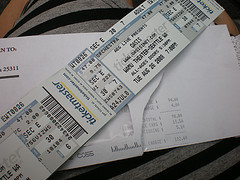When You Buy A Paperless Ticket To An Event, Do You Actually Own It?

(u2acro)
Consumers might be laboring under a misapprehension when it comes to reselling tickets to games, concerts and other live fare. One might think that purchasing a ticket would equal the right to do whatever you want with it, barring the practice of scalping. Maybe not.
A New York Times op-ed piece looks at our widely-held assumption that as long as you don’t violate any scalping laws, that ticket is yours to do with what you will. However, new ways to sell tickets have started to restrict rights when it comes to disposing of a ticket after you purchase it.
Paperless ticketing — where you buy entry with a credit card and then show that card an a photo ID at the venue — makes it difficult to give away a ticket or sell it if you can’t use it. Transfer restraints placed on those tickets are only seen elsewhere in the airline industry.
Ticketmaster uses these restrictions on resale and even giving away paperless tickets to protect against scalping and bulk-buys by bots, as well as counterfeiting. But are they really acting in the interest of consumers, or trying to control a market that has seen an influx of secondary-ticket sellers? That is a rhetorical question, of course.
So the question becomes, is it okay for Ticketmaster and others to put such restrictions on the paperless-ticket market? Probably not, says the NYT.
This week, the American Antitrust Institute is releasing a report on the paperless-ticket market by James D. Hurwitz, an institute fellow and former policy analyst at the Federal Trade Commission. The conclusion: restrictive paperless-ticket practices depart from bedrock market principles by unjustifiably limiting consumer choice and suppressing free competition. They also might violate federal and state antitrust and consumer-protection laws. And they may warrant legislation to protect the market and consumers.
Some states have already introduced legislation to enable consumers to conduct paperless-ticket transactions with each other as they see fit, including a law passed in New York in 2010 and others in the legislative process in Minnesota, Massachusetts, Connecticut, North Carolina, Florida and New Jersey.
Who Owns My Ticket? [New York Times]
Want more consumer news? Visit our parent organization, Consumer Reports, for the latest on scams, recalls, and other consumer issues.

